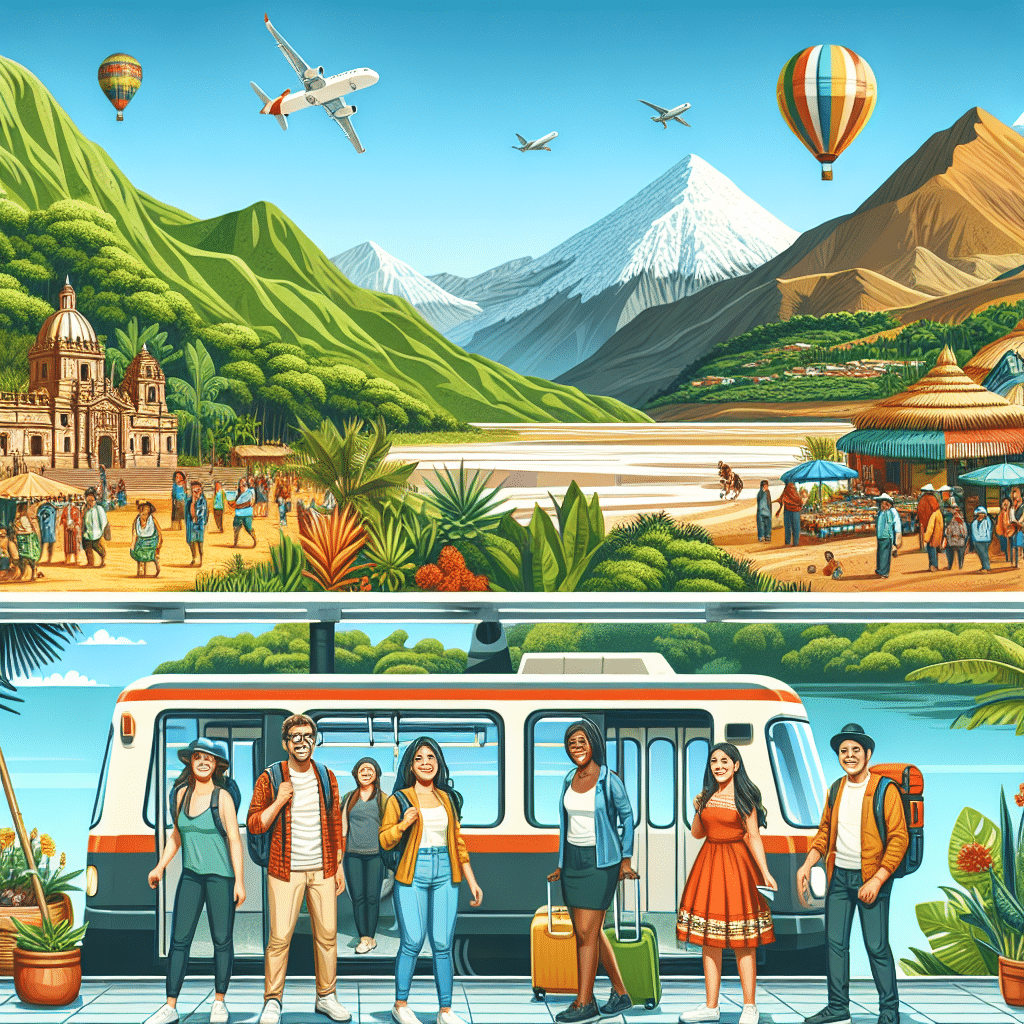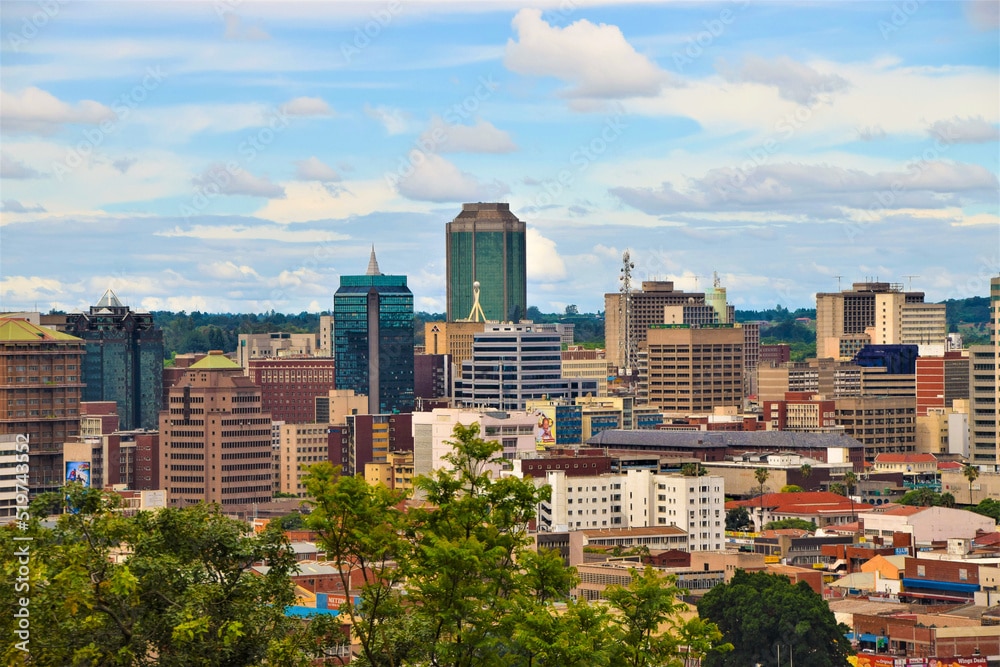
Bolivia, a landlocked country nestled in the heart of South America, is a treasure trove of natural beauty and rich cultural heritage. From the snow-capped peaks of the Andes to the otherworldly landscapes of the Uyuni Salt Flats, Bolivia offers an array of breathtaking sights that are sure to captivate any traveler.
Why it's a Must-Visit Place
Bolivia is a must-visit for any budget traveler. It's one of the least expensive countries in South America, making it a perfect destination for backpackers and budget-conscious adventurers. The country's unique blend of indigenous cultures, Spanish colonial history, and stunning natural beauty make it a fascinating place to explore.
Unique Features
Bolivia is home to some of the highest cities in the world, including its administrative capital, La Paz. The country is renowned for its diverse landscapes, ranging from the Amazon rainforest to the high-altitude desert of the Altiplano. Bolivia's rich indigenous culture, reflected in its music, food, and festivals, is another unique feature that sets it apart from other destinations.
Section 1: Preparing for Your Trip
Passport and Visa Requirements
Travelers to Bolivia must have a passport valid for at least six months from the date of entry. Citizens of most countries can obtain a visa on arrival for a stay of up to 90 days. For the most up-to-date information on visa requirements, visit the official website of the Bolivian Immigration Authority.
Packing Tips
Given Bolivia's diverse climate, packing can be a challenge. In general, lightweight clothing is suitable for the lowlands, while warm clothing is necessary for the highlands. Don't forget essentials like a good pair of hiking boots, sunscreen, and a hat for sun protection. A travel adapter for electronics and a reusable water bottle are also highly recommended.
Travel Insurance
Travel insurance is highly recommended for any trip to Bolivia. It should cover medical expenses, trip cancellation, lost luggage, and other unforeseen circumstances. Companies like World Nomads offer comprehensive travel insurance that caters to budget travelers.
Section 2: Arrival in Destination
Airport Information
Bolivia's main international airport is El Alto International Airport in La Paz. The airport offers facilities like currency exchange, restaurants, and car rental services. Taxis and minibuses are available for transportation to the city center. If you're arriving at Viru Viru International Airport in Santa Cruz, you'll find similar amenities and transportation options.
First Impressions
Upon arrival, you'll be struck by Bolivia's vibrant colors, bustling markets, and the warmth of its people. The altitude in cities like La Paz can be a challenge for some, so take it easy for the first few days to acclimatize. Coca tea, a local remedy for altitude sickness, is widely available and can help ease the transition.
Section 3: Where to Stay
Hotels and Resorts
Bolivia offers a range of accommodations to suit all budgets, from luxurious hotels to affordable hostels and homestays.
Luxury Accommodations
- Atix Hotel, La Paz
- Description: A luxury boutique hotel in La Paz offering modern amenities, stunning views of the city, and an excellent restaurant serving Bolivian cuisine.
- Cost: Approximately $200-$250 per night.
- Website: Atix Hotel
- Luna Salada Hotel, Uyuni
- Description: Situated near the Uyuni Salt Flats, this unique hotel is built entirely from salt blocks and offers breathtaking views, comfortable rooms, and guided tours of the salt flats.
- Cost: Approximately $150-$200 per night.
- Website: Luna Salada Hotel
- Camino Real Hotel, Santa Cruz
- Description: A luxurious hotel with modern amenities, a beautiful pool area, and excellent dining options, located in the heart of Santa Cruz.
- Cost: Approximately $180-$220 per night.
- Website: Camino Real Hotel
Midrange Accommodations
- Hotel Rosario, La Paz
- Description: A charming midrange hotel located in central La Paz, offering comfortable rooms, a lovely courtyard, and a great restaurant.
- Cost: Approximately $60-$100 per night.
- Website: Hotel Rosario
- Hotel Aranjuez, Cochabamba
- Description: A beautiful colonial-style hotel with lush gardens, comfortable rooms, and a convenient location near the city center.
- Cost: Approximately $80-$120 per night.
- Website: Hotel Aranjuez
- Hostal Naira, La Paz
- Description: A cozy and affordable hotel located in the heart of La Paz, offering clean rooms, friendly service, and a convenient location near major attractions.
- Cost: Approximately $50-$80 per night.
- Website: Hostal Naira
Budget Accommodations
- Wild Rover Hostel, La Paz
- Description: A popular backpacker hostel with a lively atmosphere, comfortable dorms and private rooms, and a great location in central La Paz.
- Cost: Approximately $10-$25 per night for dorm beds, $40-$60 for private rooms.
- Website: Wild Rover Hostel
- Loki Hostel, La Paz
- Description: Another favorite among budget travelers, Loki Hostel offers a fun and social environment, clean dorms and private rooms, and a range of amenities including a bar and restaurant.
- Cost: Approximately $8-$20 per night for dorm beds, $35-$50 for private rooms.
- Website: Loki Hostel
- Ecolodge La Estancia, Isla del Sol
- Description: A budget-friendly eco-lodge located on Isla del Sol in Lake Titicaca, offering simple yet comfortable accommodations with stunning lake views and opportunities to engage in sustainable tourism practices.
- Cost: Approximately $30-$50 per night.
- Website: Ecolodge La Estancia
Local Homestays
Staying with a local family is a great way to immerse yourself in Bolivian culture. Here are some reputable homestay programs:
- Sustainable Bolivia
- Description: Offers homestay programs in Cochabamba, where travelers can live with a local family and participate in sustainable development projects.
- Cost: Varies based on duration and program type; approximately $20-$35 per night.
- Website: Sustainable Bolivia
- Allkamari Boutique Eco-Resort & Spa, La Paz
- Description: Offers homestay options with local Aymara families in the Andean highlands, providing a unique cultural experience and breathtaking natural surroundings.
- Cost: Approximately $25-$40 per night.
- Website: Allkamari Boutique Eco-Resort & Spa
These accommodations offer a range of experiences, from luxurious retreats to budget-friendly hostels and immersive homestays, ensuring that every traveler can find a suitable place to stay while exploring Bolivia.
Section 4: Exploring Destination
City Guides
Bolivia’s cities offer a blend of vibrant culture, history, and breathtaking scenery. Here are detailed guides to some of the must-visit cities in Bolivia, including suggested tours and their costs.
La Paz
Overview: La Paz, the highest capital city in the world, is known for its dramatic setting and vibrant street life. The city is nestled in a deep valley surrounded by the high altiplano, with Mount Illimani in the background.
Top Attractions:
- Witches' Market (Mercado de las Brujas): A fascinating market where locals sell traditional herbs, potions, and spiritual items.
- Valley of the Moon (Valle de la Luna): A surreal landscape of eroded rock formations.
- Cable Car System (Mi Teleférico): Offers stunning views of the city and surrounding mountains.
- Plaza Murillo: The central square surrounded by important government buildings and historical sites.
Suggested Tours:
- La Paz City Tour
- Description: A comprehensive tour of La Paz, including the Witches' Market, Plaza Murillo, and a ride on the Mi Teleférico.
- Cost: Approximately $40 per person.
- Website: Red Cap Walking Tours
- Valley of the Moon and Moon Valley Tour
- Description: A half-day tour exploring the unique landscapes of the Valley of the Moon.
- Cost: Approximately $30 per person.
- Website: Valley of the Moon Tour
Sucre
Overview: Sucre is the constitutional capital of Bolivia and a UNESCO World Heritage site. The city is renowned for its well-preserved colonial architecture and rich history.
Top Attractions:
- Casa de la Libertad: The site where Bolivia's declaration of independence was signed.
- Parque Cretácico: A dinosaur park with real fossilized footprints.
- La Recoleta: A historic convent with panoramic views of the city.
- Plaza 25 de Mayo: The main square surrounded by colonial buildings.
Suggested Tours:
- Sucre Historical Walking Tour
- Description: A walking tour through Sucre's historic center, including the Casa de la Libertad and the main square.
- Cost: Approximately $20 per person.
- Website: Sucre Walking Tours
- Parque Cretácico Tour
- Description: A tour of the dinosaur park, including a visit to the fossilized footprints and the museum.
- Cost: Approximately $15 per person.
- Website: Parque Cretácico
Santa Cruz
Overview: Santa Cruz is Bolivia's largest city, known for its tropical climate, vibrant nightlife, and dynamic culture. It serves as a gateway to the Amazon basin.
Top Attractions:
- Jardín Botánico: A beautiful botanical garden showcasing the region’s diverse flora.
- Biocentro Güembé: A large nature park with butterfly domes, aviaries, and swimming pools.
- Lomas de Arena: Natural sand dunes located just outside the city.
- Plaza 24 de Septiembre: The central plaza with cafes, restaurants, and historical buildings.
Suggested Tours:
- Santa Cruz City Tour
- Description: A tour of Santa Cruz’s main attractions, including the botanical garden and the central plaza.
- Cost: Approximately $50 per person.
- Website: Santa Cruz City Tours
- Lomas de Arena Tour
- Description: A half-day tour to the natural sand dunes of Lomas de Arena, including transportation and a guided hike.
- Cost: Approximately $35 per person.
- Website: Lomas de Arena Tour
Hidden Gems
Beyond the major cities, Bolivia is full of hidden gems that offer unique experiences off the beaten path.
Tiwanaku
Overview: Tiwanaku is an ancient archaeological site near Lake Titicaca, once the center of a powerful pre-Incan civilization.
Top Attractions:
- Akapana Pyramid: A large stepped pyramid that was a central feature of the Tiwanaku complex.
- Kalasasaya Temple: A ceremonial structure with impressive stone monoliths.
- Pumapunku: An intricate stone complex that showcases advanced ancient engineering.
Suggested Tours:
- Tiwanaku Archaeological Site Tour
- Description: A full-day tour from La Paz to Tiwanaku, including guided visits to the main archaeological sites.
- Cost: Approximately $60 per person.
- Website: Tiwanaku Tours
Torotoro National Park
Overview: Torotoro National Park is a stunning area known for its deep canyons, waterfalls, and dinosaur footprints.
Top Attractions:
- Cañón de Torotoro: A dramatic canyon with a challenging but rewarding hike.
- Vergel Waterfall: A beautiful waterfall nestled within the canyon.
- Dinosaur Footprints: Real fossilized dinosaur tracks that visitors can see up close.
Suggested Tours:
- Torotoro National Park Tour
- Description: A multi-day adventure tour exploring the canyons, waterfalls, and dinosaur footprints of Torotoro National Park.
- Cost: Approximately $120 per person for a 2-day tour.
- Website: Torotoro Tours
Potosi
Overview: Potosi is a colonial mining town that was once one of the richest cities in the world due to its vast silver mines.
Top Attractions:
- Cerro Rico: The “Rich Hill” that was the source of Potosi’s silver wealth.
- Casa Nacional de la Moneda: The national mint, now a museum showcasing the history of coin production.
- San Francisco Convent and Museum: A beautiful colonial church with a museum.
Suggested Tours:
- Cerro Rico Mine Tour
- Description: A guided tour of the silver mines, offering a glimpse into the harsh conditions faced by miners.
- Cost: Approximately $30 per person.
- Website: Cerro Rico Mine Tour
- Potosi City Tour
- Description: A walking tour through Potosi’s historic center, including visits to the Casa Nacional de la Moneda and San Francisco Convent.
- Cost: Approximately $25 per person.
- Website: Potosi Walking Tours
Cultural Insights
Bolivia’s rich cultural heritage is reflected in its numerous festivals, traditional music, dance, and handicrafts.
Festivals
- Carnival of Oruro
- Description: A UNESCO-listed festival featuring colorful parades, traditional dances, and elaborate costumes.
- Time: February/March.
- Website: Carnival of Oruro
- Alasitas Festival
- Description: A unique festival in La Paz where people buy miniature items representing their hopes and dreams for the future.
- Time: January 24th.
- Website: Alasitas Festival
By immersing yourself in these city guides, tours, and cultural insights, you’ll be well-prepared to explore the diverse and captivating destinations that Bolivia has to offer.
Section 5: Food and Drink
Local Delicacies
Bolivian cuisine is a rich fusion of Spanish and indigenous influences, offering a diverse array of flavors and ingredients. From hearty meat dishes to fresh, vibrant salads, Bolivian food is a culinary adventure waiting to be explored.
Must-Try Dishes
- Salteñas
- Description: These savory pastries are a Bolivian favorite, filled with a mix of meat (usually chicken or beef), potatoes, peas, and a slightly sweet and spicy sauce.
- Where to Try: Street vendors and local markets across Bolivia, especially in La Paz and Sucre.
- Cost: Approximately $1-$2 each.
- Pique Macho
- Description: A hearty dish featuring chunks of beef, sausage, boiled eggs, and potatoes, all covered in a spicy sauce.
- Where to Try: Popular in Cochabamba and Santa Cruz.
- Cost: Approximately $5-$10 per serving.
- Silpancho
- Description: A traditional dish from Cochabamba, consisting of a breaded and fried meat cutlet served over a bed of rice and potatoes, topped with fried eggs and a tomato-onion salsa.
- Where to Try: Local restaurants in Cochabamba.
- Cost: Approximately $4-$8 per serving.
- Anticuchos
- Description: Grilled beef heart skewers marinated in a flavorful sauce, typically served with potatoes and a spicy peanut sauce.
- Where to Try: Street vendors, especially in La Paz.
- Cost: Approximately $1-$3 per skewer.
- Api and Buñuelos
- Description: Api is a warm, spiced corn drink often served with buñuelos, which are deep-fried dough pastries sprinkled with sugar.
- Where to Try: Breakfast stalls and cafes across Bolivia.
- Cost: Approximately $1-$2 for a serving of api and buñuelos.
Traditional Beverages
- Chicha
- Description: A traditional fermented corn drink, often enjoyed during festivals and celebrations.
- Where to Try: Local bars and festivals, especially in the Andean regions.
- Cost: Approximately $1-$3 per glass.
- Singani
- Description: A Bolivian grape brandy used to make the popular cocktail, Chuflay (Singani mixed with ginger ale and a slice of lime).
- Where to Try: Bars and restaurants across Bolivia.
- Cost: Approximately $3-$6 per cocktail.
- Coca Tea (Mate de Coca)
- Description: A tea made from coca leaves, commonly consumed to alleviate altitude sickness.
- Where to Try: Widely available in cafes and restaurants, especially in high-altitude regions.
- Cost: Approximately $0.50-$1 per cup.
Dining Etiquette
In Bolivia, meals are typically a social event, and there are some cultural norms to keep in mind:
- Sharing Dishes: It's common to share dishes with others at the table. If dining with locals, try a bit of everything to show appreciation for the food.
- Finishing Your Plate: It’s considered polite to finish all the food on your plate, as it shows that you enjoyed the meal.
- Tipping: Tipping is not obligatory in Bolivia, but it is appreciated. A small tip (around 5-10%) is customary in restaurants.
- Meal Times: Lunch (almuerzo) is the main meal of the day and is often a leisurely affair, typically served between 12:00 PM and 2:00 PM. Dinner (cena) is usually lighter and served later in the evening, around 8:00 PM or later.
Where to Eat
Top Restaurants
- Gustu, La Paz
- Description: A fine dining restaurant that showcases Bolivian ingredients in innovative ways, founded by the former head chef of Noma.
- Specialties: Tasting menus featuring local ingredients like llama, quinoa, and Andean herbs.
- Cost: Approximately $50-$100 per person.
- Website: Gustu
- Pronto Dalicatessen, Santa Cruz
- Description: A modern restaurant offering a mix of international and Bolivian dishes, with an emphasis on fresh, high-quality ingredients.
- Specialties: Fusion dishes and gourmet sandwiches.
- Cost: Approximately $15-$30 per person.
- Website: Pronto Dalicatessen
- La Luna, Sucre
- Description: A cozy restaurant known for its delicious pizzas and a wide variety of international dishes.
- Specialties: Wood-fired pizzas and vegetarian options.
- Cost: Approximately $10-$20 per person.
- Website: La Luna
Popular Markets and Street Food
- Mercado Lanza, La Paz
- Description: A bustling market in the heart of La Paz, offering a variety of local dishes at affordable prices.
- Specialties: Salteñas, empanadas, and freshly squeezed juices.
- Cost: Approximately $1-$5 per dish.
- Mercado Central, Sucre
- Description: A vibrant market where you can sample a wide range of traditional Bolivian foods.
- Specialties: Traditional soups, grilled meats, and fresh produce.
- Cost: Approximately $1-$5 per dish.
- Los Pozos Market, Santa Cruz
- Description: One of the largest markets in Santa Cruz, known for its diverse food stalls and fresh ingredients.
- Specialties: Street food such as anticuchos, choripan (grilled sausage sandwich), and local fruits.
- Cost: Approximately $1-$5 per dish.
Culinary Tours
For those who want to delve deeper into Bolivian cuisine, culinary tours offer a hands-on experience and insight into local food culture.
- Bolivian Cooking Classes
- Description: Learn to cook traditional Bolivian dishes with a local chef. Classes often include a market visit to buy fresh ingredients.
- Cost: Approximately $40-$60 per person.
- Website: Bolivian Cooking Classes
- La Paz Food Tour
- Description: A guided walking tour through La Paz’s markets and food stalls, sampling local delicacies and learning about Bolivian culinary traditions.
- Cost: Approximately $35-$50 per person.
- Website: Red Cap Walking Tours
- Santa Cruz Culinary Tour
- Description: Explore the diverse food scene in Santa Cruz with a local guide, visiting markets, street food vendors, and popular restaurants.
- Cost: Approximately $50-$70 per person.
- Website: Santa Cruz Culinary Tours
By exploring Bolivia's rich and diverse culinary landscape, you’ll gain a deeper appreciation for the country’s cultural heritage and traditions. Enjoy the flavors and experiences that make Bolivian cuisine truly unique!
Section 6: Outdoor Adventures
Bolivia's diverse landscapes offer a wide range of outdoor activities, from hiking in the Andes to exploring the Amazon rainforest. Here are some of the best outdoor adventures you can experience in Bolivia, complete with tour options, prices, links, and feedback reviews.
Hiking and Nature Trails
Huayna Potosi
Overview: Huayna Potosi is a popular climb for mountaineers. Standing at 6,088 meters (19,974 feet), it offers a challenging yet rewarding ascent with stunning views of the surrounding peaks.
Tour Option:
- Huayna Potosi Climbing Tour
- Description: A 3-day guided climb that includes acclimatization, equipment, and meals.
- Cost: Approximately $200-$250 per person.
- Website: Huayna Potosi Tours
- Feedback: "An incredible experience with professional guides. The climb is tough but the views are absolutely worth it!" - TripAdvisor Review
Yungas Road (Death Road)
Overview: Known as the "Death Road," this scenic route offers an exhilarating biking adventure from the high mountains to the tropical Yungas region.
https://investingtravels.com/countries/bolivia/travel-guide-bolivia/







